“I thought it was the height of hilarity to promote drugs and Satan while not doing any of it”: How Monster Magnet became metal’s ultimate space lords
Monster Magnet’s Dave Wyndorf on comic books, psychedelia and near death experiences
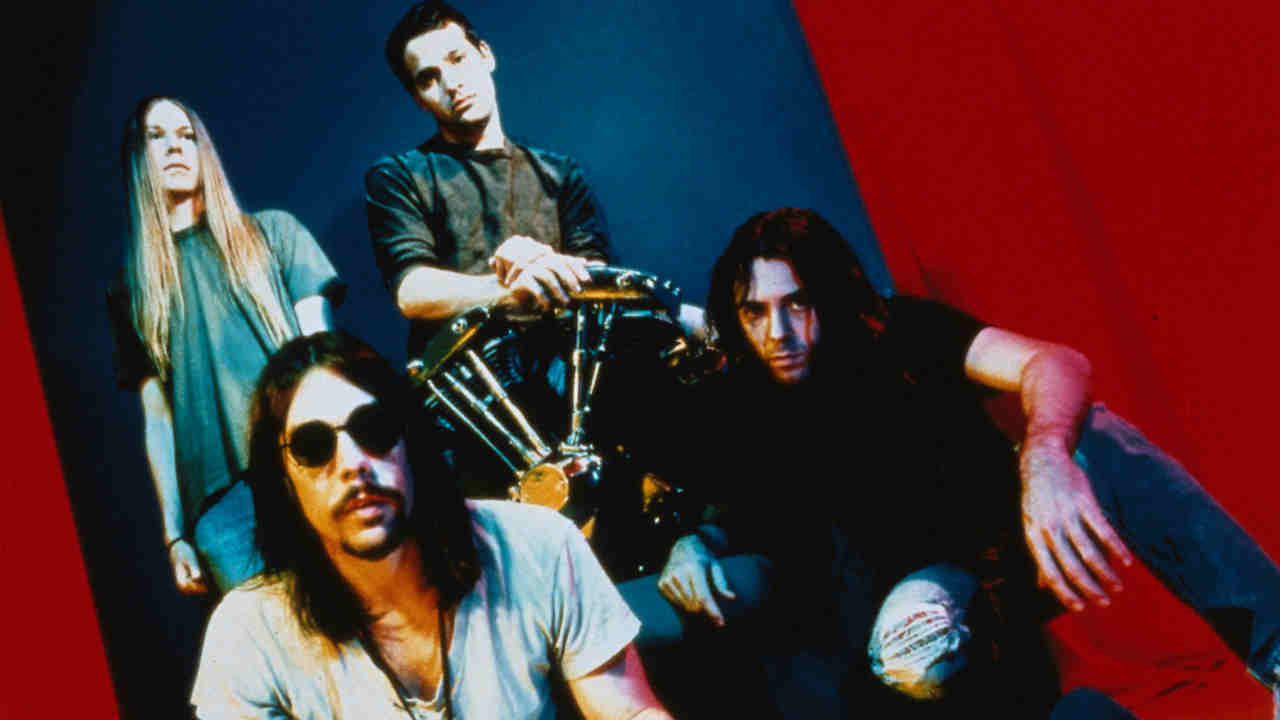
Monster Magnet are the godfathers of acid-soaked stoner metal who became unlikely mainstream stars with 1998’s monumental Powertrip album. In 2012, as the band celebrated the 21st anniversary of their debut album Spine Of God, mainman Dave Wyndorf looked back on a lifetime of comic books, LSD and one near-fatal overdose.
“I swear to God, if I press my liver against my spleen I can extract enough residual LSD to get me going again. I always wondered how much of that is memory and how much is the drug?”
It’s funny how superheroes get their powers. For Peter Parker it was a radioactive arachnid that turned him into Spider-Man, but for Monster Magnet frontman Dave Wyndorf it was the ingestion of massive amounts of LSD, followed by five years working in a comic book store. It would be foolish to say that, like most superheroes, he was previously mild mannered.
“I was 10 years old in 1967,” he says, “so when I got to my teens it was like, ‘I am ready! I am ready to eat drugs!’”
By the time he was a teenager, Dave would travel from his home in Red Bank, New Jersey up to CBGB in New York to check out bands like the Ramones and the burgeoning punk scene, and it wasn’t long before he was singing in a few bands of his own – first the covers band Hard Attack, then Shrapnel, who got as far as releasing a major label EP.
“Shrapnel went on for way too long,” says Dave. “Six years on and off playing the punk circuit, and it was kinda played out. I wasn’t happy with it so I got a bunch of normal jobs and one of them happened to be in a comic book store. When I was there I finally picked up a guitar and learned how to play and I sat in that job for maybe five years. I’d stopped listening to anything new because I was sick of it, I just listened to old 60s garage punk and Alice Cooper records, and then one day somebody came in and turned me on to Mudhoney and I was like, ‘Fuck yeah! Rock is back!’”
Inspired by what became known as grunge, Dave bought himself a four-track and started writing his first songs on guitar, just him and a drum machine, under the name Love Monster. There was an EP recorded, which is now rare as rocking horse shit, but there are glimmers of what was to become the mighty Monster Magnet. Peter Parker was still doing his day job.
Sign up below to get the latest from Metal Hammer, plus exclusive special offers, direct to your inbox!
“Meanwhile,” says Dave, “I met my really good friend Tim Cronin, and he was like, ‘I have a band with this guy named John McBain called Dog Of Mystery.’ And it wasn’t really a band, it was like a project recorded onto cassette tape using a four-track, really oddball ditties like Butthole Surfers-type madness and old Pink Floyd stuff, nothing more than a couple of minutes long.”
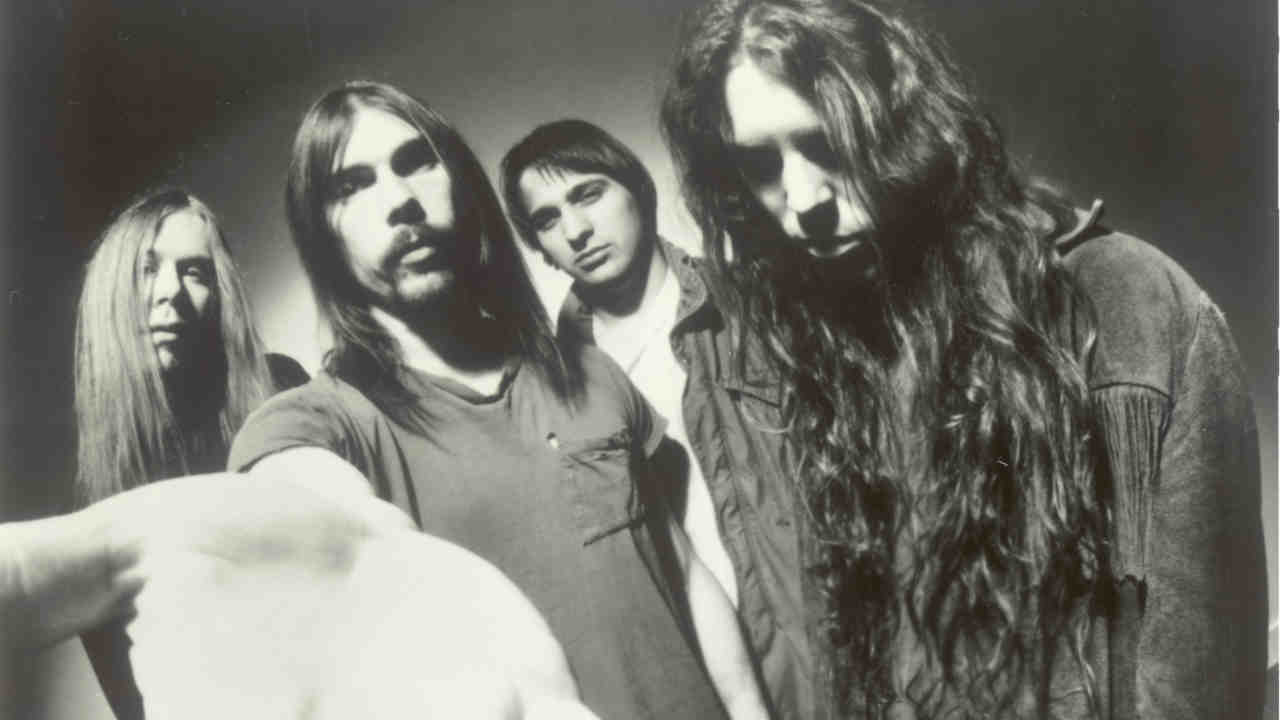
Dave joined them as a guitar player and they did shows as Dog Of Mystery, Diesel Bong, Heroin Mule, King Fuzz, Triple Bad Acid and a whole host of other names… It was no Monster Magnet yet, but Dave was starting to write more songs that were working their way into the set. Then somehow they got an offer to play with Jane’s Addiction.
“We lied our way onto the bill,” confesses Dave. “Like, ‘Oh yeah, we’re a real band.’ We weren’t a real band at all, we didn’t have a name, Tim was playing drums and he only played one of them… But we went on there and we did well. It was fucking insane, completely psychedelic: we played Grand Funk Railroad’s Paranoid for about 10 minutes and another song called Blankets Of Moo, all of it instrumental. And they liked it! When I walked off the stage the sound guy, some old hippy dude, went, ‘Hey, the return of drug rock! Cool!’ I was like, ‘That’s it! Drug rock!’ And that’s when we became Monster Magnet.”
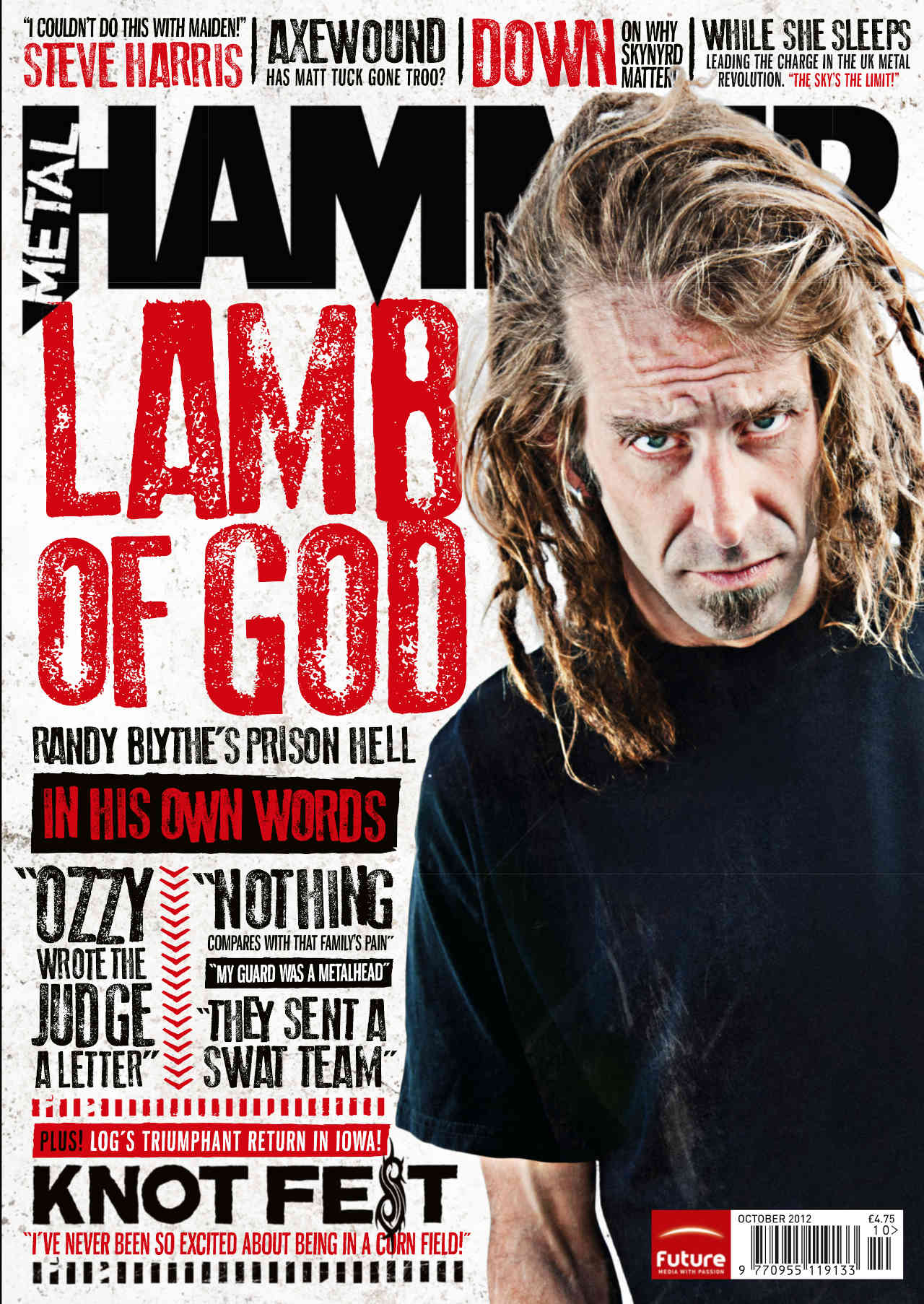
Maybe that was the night that Tim got his superpowers too, moving from drums to lights to create Monster Magnet’s psychedelic backdrop. There were lineup changes, but eventually our superhero set about his plan to rule the entire universe with Joe Calandra on bass, John McBain on guitar and Jon Kleiman on drums. Step one was to release an album that would grab the world’s attention through its hypnotic genius, and their 1992 (late ’91 in Europe) debut, Spine Of God, did just that. Accusations of selling their soul to the Devil soon followed as a testament to its brilliance.
“Well, I don’t know about that,” says Dave. “It wasn’t recorded very well and remixing it was impossible, as it was all hand-mixed. But I knew that I fucking absolutely loved doing it in a ‘Why didn’t I do this before?’ kinda way. We didn’t play that well, but I made up for it using special effects and echoes to be the feature.”
It’s the imperfections that help make Spine Of God so perfect. It pandered to nobody but Monster Magnet, a mixture of punk and psychedelia, residual drug trips and comic books, Hawkwind meets the Manson Family.
“And how fucking cool!” grins Dave. “If someone came up to me and said ‘Hawkwind and the Manson Family’, I’d be like, ‘I want to buy it!’ That was me just trying to put all my favourite shit together. It’s like I was 11 and had this room full of cool stuff, like ‘Come and look at all my cool shit! I hope you dig it.’”
We dug it. 20 years later, it has stood the tests of time. It is, as the sleeve says, “a Satanic drug thing you wouldn’t understand.”
“Oh yeah, I put drugs all over everything because it pissed people off back then and it still does!” laughs Dave. “It’s almost too easy. My party days were long over, it had been about five years since I’d gotten high, but I thought it was the height of hilarity to promote all these drugs and Satan, while not doing any of it at all. But I’d spent my entire teenhood doing all these drugs, eating acid, and trying to recreate Hunter S Thompson stories, and that’s what Spine Of God is about. That’s me trying to capture that time when I was growing up.”
“I’ve noticed that bands that play wasted, all romanticism aside, really don’t sound that good,” Dave continues. “But I think people really wanna believe that somebody is getting away with something, somewhere. They want drug heroes, they want people who are supernatural and can live on all that shit. And me too, I wanted that.”
Monster Magnet were a cult band pretty much immediately, perfectly timed to ride the stoner wave of the early 90s with only Kyuss coming anywhere close. The title track of their second EP Tab was half an hour long, a musical acid trip that wasn’t even supposed to be released under the Magnet moniker, being a weird out-take. Soundgarden dug it so much that they offered Monster Magnet a tour. But while that led to major label interest and a deal with Soundgarden’s home, A&M, the label didn’t really know what to do with them. As Dave says, “Magnet never sat well in any camp” and they certainly weren’t a grunge band.
“In that world no one was really happy. They were all on that loser trip, like ‘Whatever you do, don’t swagger or smile.’ It was still very close to the hair metal days, so I knew where they were coming from, they just didn’t wanna be that, but I was into it. I loved shoegazing bands and I loved swaggering bands, and with a sense of humour and some healthy cynicism, the cool people got it.”
The band’s major label debut in 1993, Superjudge, saw Ed Mundell move in on guitar, and while perhaps not as perfect as Spine Of God it remains a truly great album.
“We went to The Magic Shop in New York City with a complete 24-track,” he recalls. “I don’t know how, but we made a record that sounds like we took a step backwards. I was so freaked out that we’d signed to a major label, and so freaked out that it’d sound too nice, that I literally made the record almost impossible to listen to sonically. It was made in a hurry, and it was hell, too, because one member was really living the dream. He went out to take LSD and then came to the studio and forgot all the parts, all tripped out. That was an insane time.”
Dopes To Infinity came next in 1995 and spawned a minor hit with Negasonic Teenage Warhead. It later saw Dave’s love of comic books come full circle when Grant Morrison named a character from X-Men after the song.
“He used a quote from Melt in the foreword of a Jack Kirby book too,” says Dave, who wrote Ego, The Living Planet in tribute to Kirby. “I could have retired right there!”
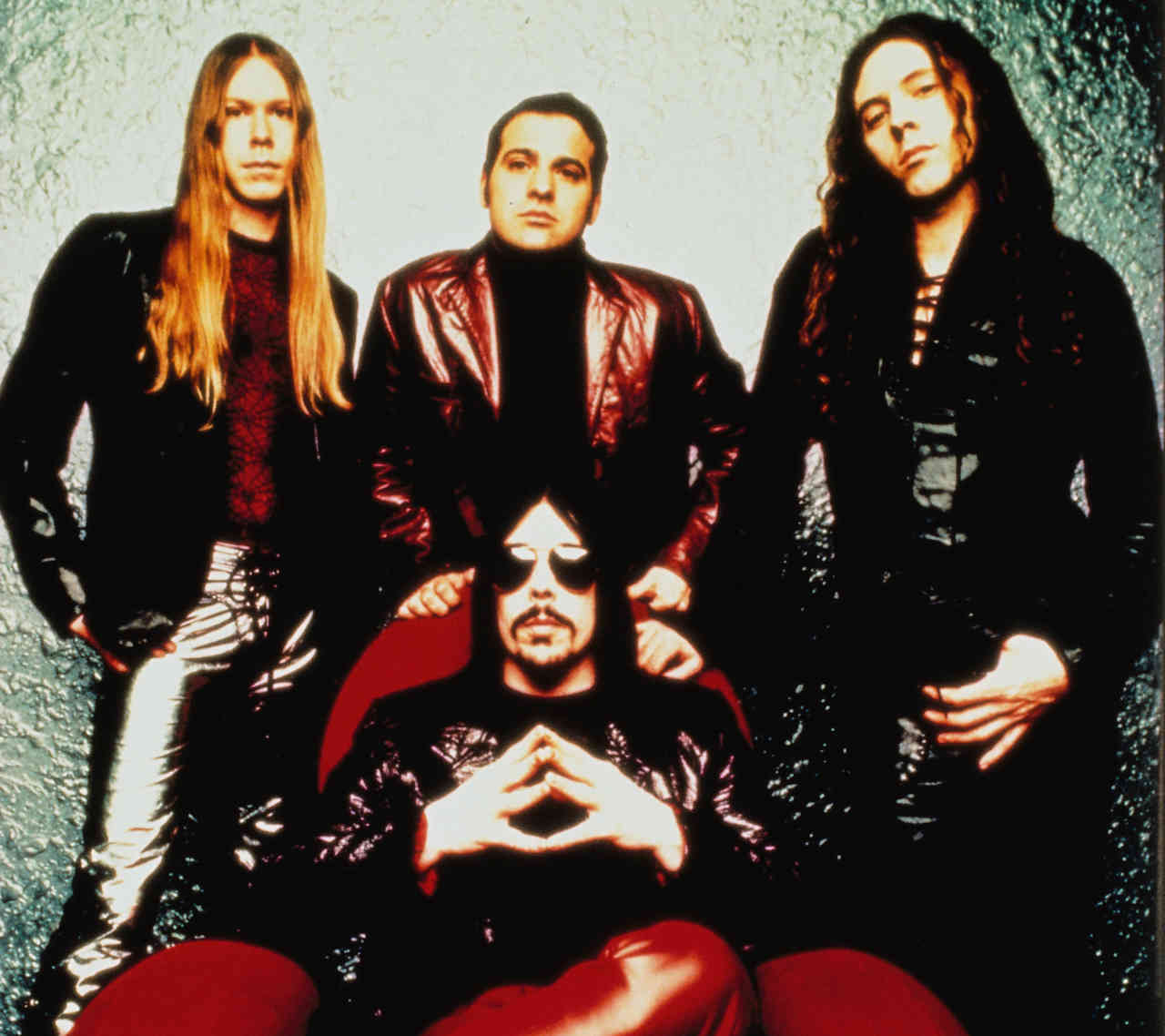
At the same time, Dave’s other wildest dreams were coming true as well, and he was fully immersed in such debauchery that he’d point out girls he liked in the crowd with a spotlight and have someone round them up for him.
“It was totally nuts!” laughs Dave. “But sometimes if you get the opportunity…”
You’d be a muppet not to take it.
“Yes! I knew I didn’t want to be anyone else forever, but I certainly wanted to be somebody else for a while and this was the closest I was gonna get. In retrospect I can put it that way, although I probably didn’t feel that way at the time. It was a cool lifestyle and much more debauched than you could ever imagine without drugs. It got out of hand! Dopes… is really when that started.”
Meanwhile, there was a major record label who really didn’t know what to do with the band, and who were growing increasingly vocal about their disappointment at record sales in the US. In the UK, Monster Magnet could sell out the 2000-capacity Astoria, but in the US it was still mostly bars and small clubs.
“They signed Monster Magnet saying that they didn’t know what we do, but they wanted us to do it here and they’ll make it sell, which sounded good to us,” explains Dave. “But then they didn’t get it, so I asked myself: ‘What do I have to do – put tits and money on the record and make it that fucking simple?’ And then the idea grew on me so I went to Las Vegas! I was thinking about Hunter S Thompson, Fear And Loathing and all that cool stuff, like, ‘Yeah, writers do this shit, they go away and get away with it!’ I had the name for the record before the song was written: it was gonna be called Powertrip and I decided to put on some leather pants and rock the shit out of it!”
The result, 1998’s Powertrip, was another work of undiluted genius and the first album to see real commercial success, particularly with the hit Space Lord, which showed up eight years later in Talladega Nights. With a new second guitarist, Dave’s friend Phil Caivano, joining the band, Monster Magnet could do no wrong. They were so good in fact that one headliner they toured with started restricting their show, ‘No dancing girls, no flaming guitars, no blowing us off stage every night!’ Which didn’t stop Monster Magnet setting the entire stage on fire at the Big Day Out festival in Milton Keynes in 1999.
“That was amazing!” laughs Dave Wyndorf. “We wrapped linen sheets around everything and soaked them in gasoline, and we’d done fire before, but this was a lot of fire. It was like fucking Dresden up there! It looked like a jet plane had crashed into the stage!”
Expectations were high for the next album and Dave talked of going to Vietnam to write it, soaking up some of the Apocalypse Now vibe, but things went wrong. Recorded in Canada and mixed in London, 2000’s God Says No was a hit and miss affair, not helped by that fact that Dave lost all the lyrics and had to rewrite them while the album was being recorded. Worse still, it seemed like Monster Magnet were fast losing their mojo and that Wyndorf’s superpowers were fading. Gods Says No was to be the last record on A&M and the last to feature Joe Calandra and Jon Kleiman. Perhaps wanting to cash in while they still could, the record label stuck out a greatest hits album. It would be four years before Monster Magnet would record their next album, Monolithic Baby!, but again something was missing.
“I think it was more rock’n’roll,” argues Dave. “I wanted to write three-and-a-half-minute rock’n’roll songs like Monolithic and Unbroken (Hotel Baby), and make a trashy album. It was our first record for SPV and the budget was tight. This was the first album with the new bass player, Jim Baglino, and a guy named Michael Wildwood on drums, who only played on that album. That record was done fast and if I had to do it over again I would do more rock’n’roll songs and leave out the Monster Magnet songs, so it would be a short and fast kinda album.”
Meanwhile Monster Magnet were “touring the living shit” out of Monolithic Baby! and Dave had started taking prescription pills to sleep, his doctor obliging with ever increasing doses. It turned out to be his kryptonite.
“My doctor’s in prison now!” laughs Dave. “Turns out he was one of those Dr Feelgood types who like to keep the patients high so he always had a full surgery.” But with the doctor gone, Dave went into complete withdrawal, unable to function. He should have been writing and practising for the next album 4-Way Diablo…
“But instead I was freaking out trying to get enough drugs to keep me sane,” he confesses. “I didn’t tell anyone what was going on, but I could barely get through a rehearsal.”
Two weeks into the recording of the album he hadn’t even stepped inside the studio.
“They recorded the whole thing without vocals so I called them up and said, ‘I’ve got a big problem here, I’ll tell you about it later, but everybody stop. Go home.’”
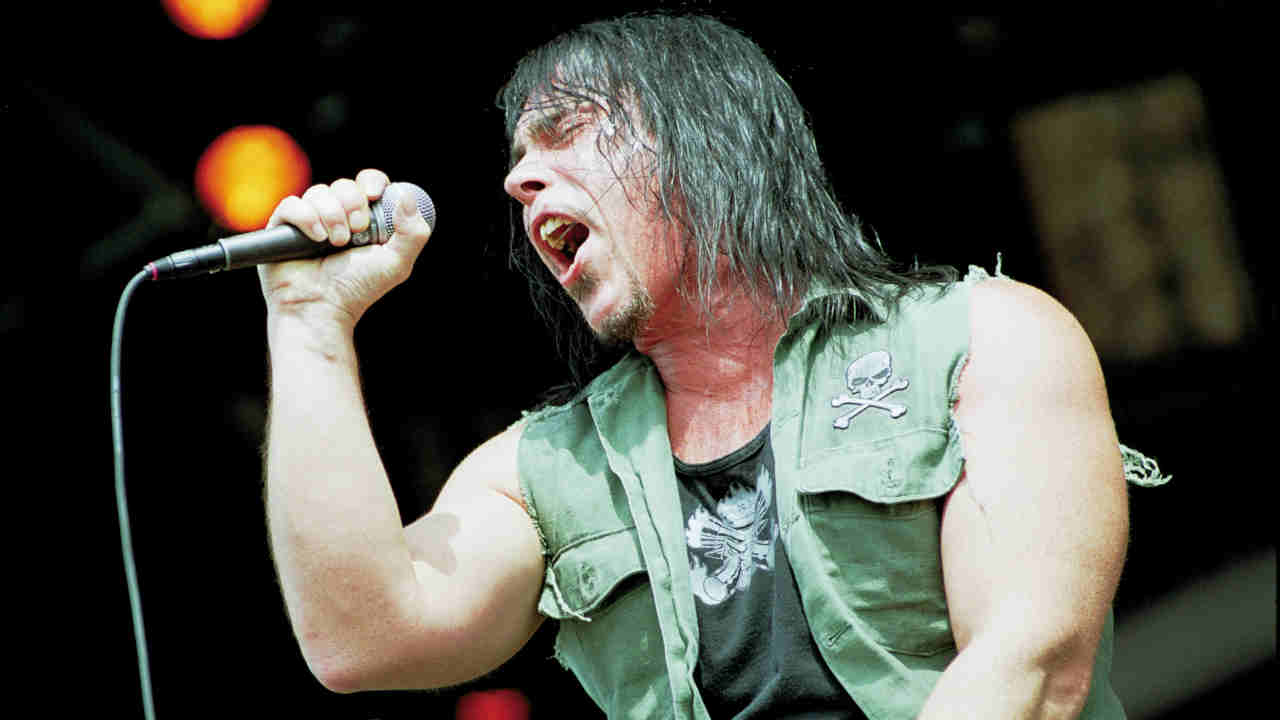
Dave checked himself into rehab, but such is the insanity of the American health care system, they just gave him more pills. Apparently there was a risk of seizures and they didn’t want to be legally responsible.
“So they gave me the drug I was trying to kick,” says Dave, “and I went completely berserk! I did them all! And that was the end of that, ambulance, OD, the whole thing.”
Not entirely surprisingly, 4-Way Diablo was far from Monster Magnet’s best work and the album was never toured.
“There’s some good stuff on it,” reasons Dave, “but that record’s not consistent because it’s taken from pieces of this and that. I wasn’t happy with the way it sounded, but it’s got a lo-fi charm.”
All looked bad for our superhero, who took a full year out until he looked at his bank balance and realised that he might soon be a homeless superhero. But while necessity may have forced him back into the leather pants, they also fit right for the first time in a few years, and a hungry Dave Wyndorf wrote the appropriately named Mastermind.
“Mastermind was like, ‘I’m back and I’m gonna make a goddamn giant Monster Magnet record!’ I wrote that thing in about two weeks and it turned out amazing. I was hellbent on making a version of classic Monster Magnet, something that had a lot of balls to it, and a lot of it was just me getting my balls back.”
Released in 2010, Mastermind certainly had balls, and not just the balls to rock out, but the balls to be Monster Magnet again, cool in a way they were never supposed to be, like some geeky kid who did too much acid and worked in a comic book store, and wanted to show you the cool shit in his bedroom. By night he’d put on leathers and try to rule the world. Songs in films like The Matrix, Talladega Nights and Bride Of Chucky, X-Men characters called Negasonic Teenage Warhead and one of the most notorious rock bands on the planet playing sell out nights with their classic albums: some geeky kid from New Jersey thought that up and made it happen. So there was a masterplan after all. Mastermind seemed apt.
“The word ‘mastermind’ has always been a cool word,” chuckles Dave. “You always think of criminal masterminds, but this came from a gig in Texas before the drug meltdown. I was trying to come on to this girl in this really cheap roadside motel. I was trying to explain all my ideas, trying to be cool, and she went ‘Well, you’re a real mastermind aren’t you!’”
Praise be to the Bullgod, Monster Magnet are back.
Originally published in Metal Hammer issue 236, October 2012
A veteran of rock, punk and metal journalism for almost three decades, across his career Mörat has interviewed countless music legends for the likes of Metal Hammer, Classic Rock, Kerrang! and more. He's also an accomplished photographer and author whose first novel, The Road To Ferocity, was published in 2014. Famously, it was none other than Motörhead icon and dear friend Lemmy who christened Mörat with his moniker.

